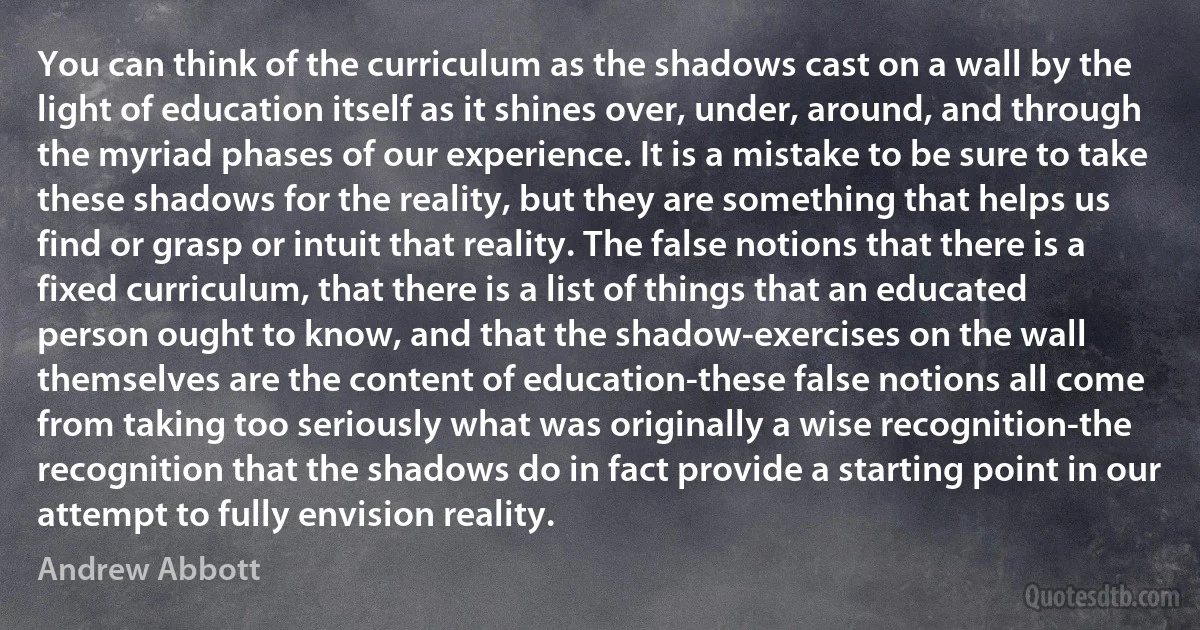Cast Quotes - page 19
As yonder tower outstretches to the earth
The dark triangle of its shade alone
When the clear day is shining on its top;
So, darkness in the pathway of man's life
Is but the shadow of God's providence,
By the great Sun of wisdom cast thereon;
And what is dark below is light in heaven.

John Greenleaf Whittier
May you be able to overclimb the obstacles custom, tradition, thoughtlessness, and habit have built up; may even such poor words as mine win you to the realization that there is no joy in life like the joy of discipleship, no so-called sacrifice that can be made which is not as the dross cast into the fire where gold comes out instead; oh! that in the hearts of even a few of you - one here and there scattered through this vast audience - the feeble words may light the eternal flame, and the passing movement caused by speech may grow into resolute will and a determined endeavor. Oh, then for you, too, in the near future there awaits the Finding of the Master, for you also who seek shall find; if you knock with the hammer of these Qualifications, surely the door shall swing open before you, that you may find Him, as I have been blessed enough to find Him, that you may know that service which is perfect freedom, that joy which is in the presence of the Master.

Annie Besant
We came from a conservative family, many of whom had never even gone to school. But I was sent to a convent and everyone was very proud that I was educated. So once while I was performing in Madras, a director from AVM studios spotted me. They were looking for a fresh face and they immediately wanted to cast me, and my grandmother grudgingly accepted.

Vyjayanthimala
I gave up the Old Testament on account of its mistakes, its absurdities, its ignorance and its cruelty. I gave up the New because it vouched for the truth of the Old. I gave it up on account of its miracles, its contradictions, because Christ and his disciples believed in the existence of devils-talked and made bargains with them, expelled them from people and animals. This, of itself, is enough. We know, if we know anything, that devils do not exist-that Christ never cast them out, and that if he pretended to, he was either ignorant, dishonest or insane. These stories about devils demonstrate the human, the ignorant origin of the New Testament.

Robert G. Ingersoll
25 May 1679: ‘Khan-i-Jahan Bahadur returned from Jodhpur after demolishing its temples, and bringing with himself several cart-loads of idols. The Emperor ordered that the idols, which were mostly of gold, silver, brass, copper or stone and adorned with jewels, should be cast in the quadrangle of the Court and under the steps of the Jama Mosque for being trodden upon.'

Aurangzeb
Not long after his (Justinian) accession, he reaffirmed the penalties which previous Emperors had enacted against the pagans, and forbade all donations or legacies for the purpose of maintaining "Hellenic impiety,"... by making the profession of (Christian) orthodoxy a necessary condition for public teaching Justinian accelerated the extinction of "Hellenism."... This event had a curious sequel. Some of the philosophers whose occupation was gone resolved to cast the dust of the Christian Empire from their feet and migrate.

J. B. Bury
Fabio Colonna deserves to be distinguished; for, although he gave way to the dogma that all fossil remains were to be referred to the Noachian deluge, he resisted the absurd theory of Stelluti, who taught that fossil wood and ammonites were mere clay, altered into such forms by sulfurous waters and subterranean heat; and he pointed out the different states of shells buried in the strata, distinguishing between, first, the mere mould or impression; secondly, the cast or nucleus; and thirdly, the remains of the shell itself. He had also the merit of being the first to point out, that some of the fossils had belonged to marine, and some to terrestrial testacea.

Charles Lyell
At first we got along very well. Esipova even boasted outside the class that she had pupils who wrote sonatas (I completed Sonata, Op. 1, and played it to Esipova, who took it home and inserted pedaling). But before long trouble began. Esipova's method of teaching was to try to fit everyone into a standard pattern. True, it was a very elaborate pattern, and if the pupil's temperament coincided with her own, the results were admirable. But if the pupil happened to be of an independent cast of mind Esipova would do her best to suppress his individuality instead of helping to develop it. Moreover, I had great difficulty in ridding myself of careless playing, and the Mozart, Schubert and Chopin which she insisted on were somehow not in my line. At that period I was too preoccupied with the search for a new harmonic idiom to understand how anyone could care for the simple harmonies of Mozart.

Anna Yesipova
Cesalpino, a celebrated botanist, conceived that fossil shells had been left on the land by the sea, and had concreted into stone during the consolidation the soil; and in the following year (1597), Simeone Majoli went still farther, and coinciding for the most part with views of Cesalpino, suggested that the shells and matter of the Veronese, and other districts, might have cast up, upon the land, by volcanic explosions, like those gave rise, in 1538, to Monte Nuovo, near Puzzuoli.- This hint was the first imperfect attempt to connect the position fossil shells with the agency of volcanoes, a system more fully developed by Hooke, [Antonio] Lazzaro Moro, Hutton, and other writers. Two years afterwards, Imperati advocated the animal origin of fossilized shells, yet admitted that stones could vegetate by force of 'an internal principle,' and, as evidence of this, he referred to the teeth of fish, and spines of echini found petrified.

Charles Lyell


!["We know who the chicken hawks are. They talk tough on national defense and military issues and cast aspersions on others," he said. "When it was their turn to serve where were they? AWOL, that's where they were...the lead chickenhawk against Sen. Kerry [is] the vice president of the United States, Vice President Cheney. (Frank Lautenberg)](https://cdn.quotesdtb.com/img/quotes_images_webp/00/frank-lautenberg-cast-chicken-427100.webp)
